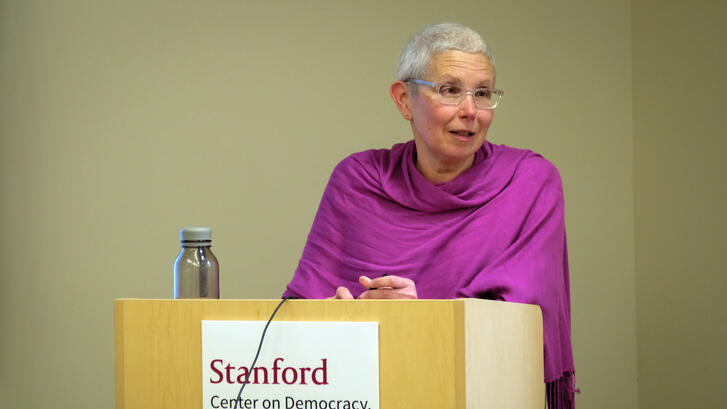Corruption in Ukraine and EU Accession
Is Ukraine too corrupt to be a part of the European Union? In a recent Rethinking European Development and Security (REDS) seminar talk co-hosted by CDDRL and The Europe Center, Maria Popova, McGill University Associate Professor of Political Science, assessed how serious the issue of Ukrainian corruption really is. While some observers have claimed that Ukraine’s corruption renders it unprepared for EU accession, Popova’s research suggests otherwise. Contrasting Ukraine to recent EU entrants — Bulgaria, Romania, and Croatia — she finds that corruption indices are not very helpful in drawing reliable conclusions.
In all four said countries, corruption is touted as the most salient issue, with strikingly similar scandals occurring across them. Over the last ten years, Ukraine has developed an extensive anti-corruption infrastructure, forming institutions for the prevention, investigation, and prosecution of corruption cases, as well as for asset recovery. These institutions have produced mixed results, and issues of political competition between institutions have tainted their wider reputation, with the National Agency for Prevention of Corruption receiving the most positive feedback. Innovative e-procurement systems like ProZorro have been internationally praised. Ukraine is unique in that its anti-corruption infrastructure came well before attempting EU accession.
Bulgaria, on the other hand, established its anti-corruption agencies ten years after becoming an EU member. These institutions have since become politically compromised; so much so that anti-corruption reformists recently forced their abolition.
In Romania, institutions were created around the time of accession and have been successful in holding corrupt oligarchs accountable. Similarly, Croatia’s anti-corruption reforms proceeded during accession negotiations.
Although the four countries adopted similar anti-corruption institutional reforms, today Ukraine tracks as significantly more corrupt than the EU members across measures of regime, public sector, executive, and political corruption, even though it is cleaner than Romania was when it started accession negotiations, more corrupt than Bulgaria was, and equally corrupt as Croatia at its start of negotiations. Why? Popova argued that the indices are fundamentally non-comparative and thus need to be taken with a grain of salt. The score for each country is determined by experts that focus exclusively on that country, who consider variation in corruption over time only. Moreover, the abstract conceptual definition of corruption is applied to their narrow case knowledge and experience and thus reflects local, rather than generalizable conceptualization.
While index scores correlate with local perceptions, this, too, may just reflect a narrative on the ground. If the local narrative is that the country is highly corrupt, the population will likely perceive it to be, with no sense of its real magnitude.
When analyzing Ukraine’s anti-corruption institutions, Popova finds that Ukraine is better prepared for EU accession than is widely assumed.
Read More
While some observers have claimed that Ukraine’s corruption renders it unprepared for EU accession, Maria Popova’s research suggests otherwise.












